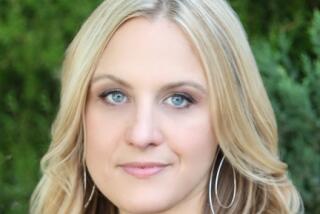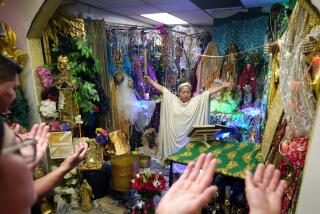Pentecostals Sing Hallelujah Over Their Growth : Fundamentalists: God Is Love alone has opened churches in almost every South American country in the last 30 years. The most explosive growth has occurred since 1960, with the number of churches doubling every 10 years.
- Share via
RIO DE JANEIRO — Hundreds of shouted hallelujahs and amens rise out of a warehouse-like church and echo through the storefronts of a crumbling downtown neighborhood. The worshipers are members of the God Is Love Pentecostal Church, part of the exploding fundamentalist movement in this coastal metropolis of 9 million.
The largest number of the world’s 1 billion Roman Catholics live in Latin America, 129 million of them in Brazil. Brazil’s 1991 census listed 12.6 million evangelical Protestants, but estimates have run as high as 25 million. Pentecostals account for more than 60% of existing evangelical churches in greater Rio de Janeiro.
Ninety percent of new, growing churches in Brazil are Pentecostal, said Andre Luis de Melo, an anthropologist and researcher at the Religious Studies Institute, an independent, nonprofit social research organization here.
God Is Love alone has opened churches in almost every South American country in the last 30 years, 7,500 of them in Brazil, including 600 in Rio. Other Pentecostal churches claim similar growth rates on the continent. Rio, where five new evangelical churches open every week, “is the center of the Pentecostal earthquake,” Melo said.
Pentecostalism, a 20th-Century evangelical Christian movement that believes in tangible manifestations of the Holy Spirit, arrived in Brazil in 1910 when an Italian immigrant founded the Christian Congregation of Brazil in Sao Paulo.
A year later, two Swedish missionaries brought the Assembly of God, a Pentecostal sect, from the United States to the Amazonian city of Belem.
The most explosive growth among the evangelicals has occurred since 1960, with the number of churches doubling every 10 years.
Dwight Gibson, an associate director of the World Evangelical Fellowship in Wheaton, Ill., says Africa and Asia also show tenfold increases in evangelical populations in the same period.
He attributes this phenomenal growth partly to the end of military rule in Brazil and other developing countries.
“There has been a lot of political and economic change in Brazil,” he said. “In times of change, you see people coming to God.”
Rubem Cesar Fernandes, 52, a Rio social activist and former Columbia University anthropology professor, differs. “It grew from very small churches with local leadership,” he said. “It’s like a fire, really. It’s very hard to say why right at this moment.” Three times as many Pentecostal churches can be found in poor Rio neighborhoods as in wealthy and middle-class areas.
“The people have a thirst, a big emptiness in their souls,” said Daniel de Mattos, 24, a God Is Love minister in Rio. “It’s easy for them to accept evangelism, because they come and feel liberated.”
Another key to the Pentecostals’ growth is participation, Melo said. A person off the street, he said, “has no way to lead a Mass in the Catholic Church. In any of these Pentecostal churches, you or Joe or John or Mary can enter and start leading, talking, singing. This is a significant thing.”
Catholics have risen to the Pentecostals’ challenge by holding their own charismatic services in several Rio churches. But the Rev. Estevao Bettencourt, 74, a theology professor for the Archdiocese of Rio, acknowledges that his denomination is “more serious, more sober. The Catholic Church cannot keep up with all this exuberance, the expressions of the evangelicals.”
Brazil is home to a rich mix of faiths, including Candomble, brought from Africa by the slave trade, and Umbanda, an eclectic combination of Catholicism, Candomble and European spiritualism.
Traditionally, the religions have intertwined. “You could be a Catholic, frequent a spiritualist center, an Umbanda center and an Oriental religion. You could be these four things at once,” Melo said. “The change the evangelicals are producing in the Brazilian religious world is this exclusion of other religious options. This is new.”
Formal education takes a back seat among some Pentecostal clergy. “We don’t study,” Mattos admitted. “We need a thorough knowledge of the Bible and a call from God.”
Some God Is Love ministers practice faith healing. At a recent evening service, the Rev. Odair Gomes called forward a woman with an ovarian cyst. They prayed amid the roar of the congregation for God to make the cyst disappear.
Bettencourt disagrees with this approach. Faith healers, he said, “promote wonders, miracles, cures, anything that satisfies the soul today. The Catholic Church cannot promise miracles.” Later in his service, Gomes called for Catholics in the congregation to approach the altar and convert to Pentecostalism. Forty-two came up.
“Do you want to live in heaven or the inferno?” Gomes asked through the loudly amplified sound system. “Heaven!” the converts shouted, to the cheers of the congregation.
Bettencourt views the Pentecostal inroads as a result of poor religious education and lack of communication by the Catholic Church. “The people say they are Catholic,” he said, “but they’re not familiar with the faith.”
Geography also has something to do with it, Melo said. “Most of the Catholic churches are in the center of the city, where the city already grew. The Pentecostals are arriving where the city is growing. It’s a question of the elephant versus the ant. The rhythm of the ant is crazier, faster.”
Fernandes sees great potential impact from the growth of Rio’s Pentecostal churches.
“They have an answer for participation that the politicians have not found yet,” he said. “They are very successful in speaking to the very poor. The political left would love to do that. The Catholic Church would love to be able do that again.
“It’s a powerful symbolic change,” he said. “They are destroying Brazilian culture. You’re not supposed to do samba if you are a member of one of these churches.”
More to Read
Sign up for Essential California
The most important California stories and recommendations in your inbox every morning.
You may occasionally receive promotional content from the Los Angeles Times.













